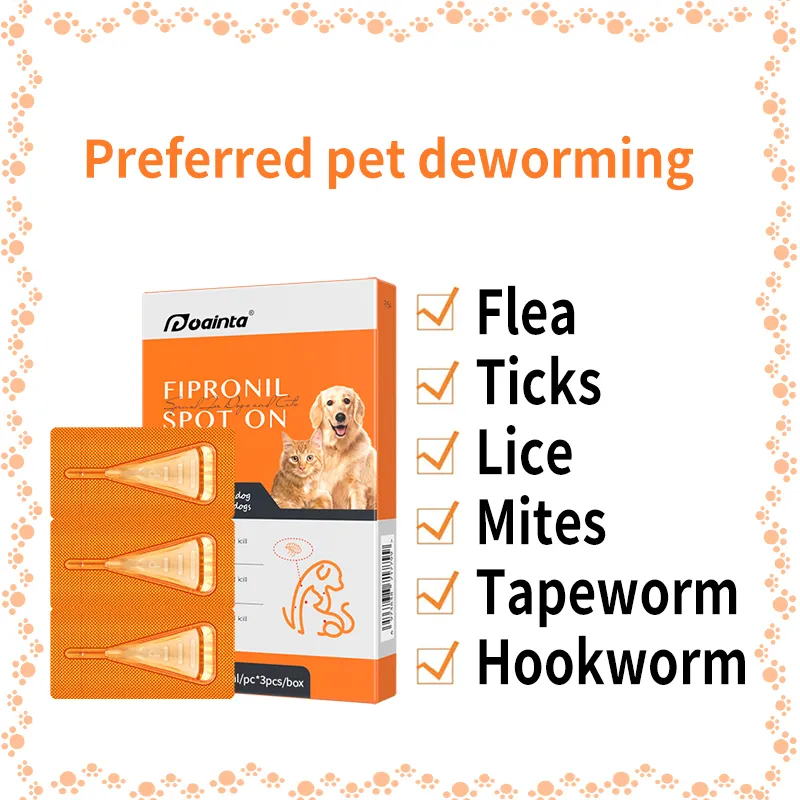- English
- Philippines(PHP ₱)
No relevant currency found

New Arrival

Best Sellers

A flea collar that repels insects for up to 2 months and is also lickable and safe. The ability for pets to wear it without causing harm if they lick it adds an extra layer of safety. It's important to ensure that any product used on pets is both effective and non-toxic.

- - Provides fast-acting, long-lasting flea and tick protection for pets 8 weeks or older
- - Kills scabies mites, adults, larvae, ticks, fleas, lice, eggs.
- - Waterproof 24 hours after application
- - Easy to apply for once a month for lasting protection
Symptoms of Worms in Dogs/ Cats
In some cases, you may actually see worms in your dog's stool, around the anal area, or even in vomit.
Worm infestations often cause gastrointestinal symptoms such as diarrhea, which may contain blood or mucus.
Despite maintaining a normal or increased appetite, dogs with worm infestations may lose weight due to the parasites consuming nutrients from their bodies.
Particularly in puppies, a distended or potbellied appearance may be indicative of a heavy worm burden, especially with roundworms.
Some types of worms, such as tapeworms, can cause itching and irritation around the anus. You may notice your dog scooting or licking excessively at their hind end.
Puppy Deworming Schedule
Puppies should receive their first deworming treatment at around 2 weeks of age. This helps to target any roundworms or hookworms that they may have acquired from their mother.
The second deworming treatment is typically administered at 4 weeks of age. This helps to continue targeting roundworms and hookworms and may also address any new infestations that have occurred since the first treatment.
By the time puppies reach 6 to 8 weeks of age, they should receive their third deworming treatment.
At 12 weeks of age, puppies should receive their fourth deworming treatment. This treatment helps to ensure that any remaining parasites are eliminated and reduces the risk of reinfestation.
Some veterinarians may recommend a fifth deworming treatment at 16 weeks of age, particularly if the puppy is at high risk of parasite exposure or if there has been a history of persistent infestations.
After completing the initial puppy deworming schedule, it's essential to follow up with regular deworming treatments as recommended by your veterinarian. Depending on your puppy's lifestyle and risk factors, they may need to be dewormed every 3 months or on an annual basis.
Product information
Preferential Package
How Flea Collars Work
Flea collars work by releasing chemicals that repel and/or kill fleas and other insects. They can prevent flea eggs from hatching and larvae from developing into adult fleas. And flea collars contain ingredients that repel fleas and other insects, making the pet less attractive to them. These repellents often have a strong odor or taste that insects find unpleasant.
When the pet wears the collar, these chemicals spread over the pet's fur and skin, creating a barrier that repels or kills fleas and prevents infestations.
-
Preferential Package
-
How Flea Collars Work
Flea collars work by releasing chemicals that repel and/or kill fleas and other insects. They can prevent flea eggs from hatching and larvae from developing into adult fleas. And flea collars contain ingredients that repel fleas and other insects, making the pet less attractive to them. These repellents often have a strong odor or taste that insects find unpleasant.
When the pet wears the collar, these chemicals spread over the pet's fur and skin, creating a barrier that repels or kills fleas and prevents infestations.
FAQS About Deworms
The frequency of deworming a puppy depends on various factors including their age, health status, environment, and exposure to parasites. Generally, puppies should be dewormed starting at 2 weeks of age, then every 2 weeks until they are 12 weeks old. After that, they should be dewormed monthly until they are 6 months old.
After deworming your dog, it's generally advisable to wait for a certain period before giving them a bath. This waiting period can vary depending on the specific deworming medication used and the instructions provided by your veterinarian or the product label.
Albendazole can be administered orally to dogs and cats. You can mix the prescribed dose of albendazole powder or suspension with your pet's food to ensure they consume the medication. Alternatively, your veterinarian may provide albendazole tablets or chewable tablets, which can be administered directly into your pet's mouth or crushed and mixed with food.
Sign up and save
Subscribe to get more health tips about your pet and 20% OFF for Your Order.



















